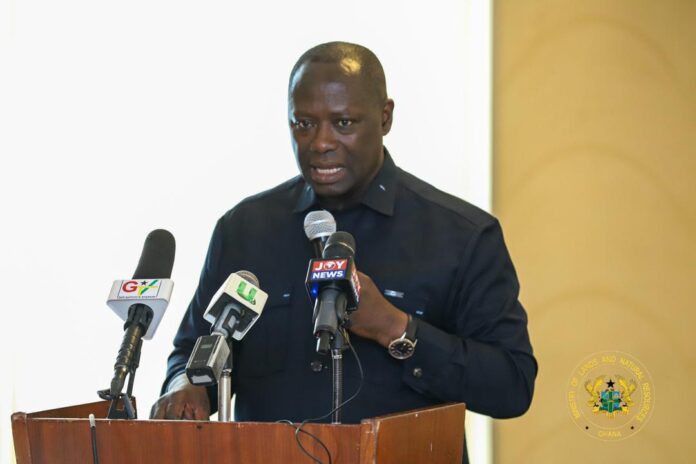Ghanaian think tank, Solidaire Ghana has kicked against the renewal of contracts by governments for public officials due retirement.
This comes after the Akufo-Addo government extended the contract of the Auditor-General, Johnson Asiedu, who was due for retirement.
In the recent past, the government extended the contract of a Police Chief, Mr. James Oppong Boanu, Immediate past Commissioner General of Ghana Revenue Authority Rev. Amishaddai Owusu-Amoah and the Present Commissioner General Ms. Julie Essiam.
The development has sparked controversies in some quarters of the aforementioned state institutions, raising concerns about nepotism and possible escalation of corrupt activities in those offices.
The Director for Policy and Planning at Solidaire Ghana, Alexander Twum-Barimah Esq., has condemned the act which he argues can have a negative effect on the workers in such institutions.
In a statement, Twum-Barimah, among other reasons, noted that the act by President Akufo-Addo stifles innovation and development.
According to the legal practitioner, bidding officers due for retirement fare well “provides an opportunity to introduce fresh perspectives and innovative ideas into the organization.”
” New leaders can bring different approaches and strategies, fostering a culture of creativity and progress into institutions such as Ghana Revenue Authority, Ghana Police Service among others,” he added.
He charged the Akufo-Addo government to “have an effective succession planning which is essential for the sustainability of public institutions” and allow ” “retirements to proceed as scheduled” to encourage the development of a pipeline of future leaders.
He further emphasized that stopping such contract extensions would ensure that “younger employees have opportunities to advance and contribute to the organization’s success.”
” Its therefore necessary to prevent stagnation, thus, prolonging the tenure of retired officials can lead to organizational stagnation.”
Below is the statement;
The Case Against Extending Contracts for Public Officials Due for Retirement
Introduction
The practice of Ghana government extending contracts for public officials who are due for compulsory retirement has sparked significant debate. While proponents argue that experienced officials bring valuable expertise, there are compelling reasons to avoid extending such contracts. This article outlines key reasons why contracts should not be given to public officials who are due for retirement, emphasizing the need for organizational renewal, fairness, and long-term planning. Practical examples of such officials who have received such contracts are the present Auditor General of Ghana Mr. Johnson Akuamoah Asiedu, Former Inspector General of Police Mr. James Oppong Boanu, Immediate past Commissioner General of Ghana Revenue Authority Rev. Amishaddai Owusu-Amoah and even the Present Commissioner General Ms. Julie Essiam among others.
1. Encouraging Organizational Renewal and Innovation
1.1 Fresh Perspectives; Retirement of senior officials provides an opportunity to introduce fresh perspectives and innovative ideas into the organization. New leaders can bring different approaches and strategies, fostering a culture of creativity and progress into institutions such as Ghana Revenue Authority, Ghana Police Service among others. Government must therefore have an effective succession planning which is essential for the sustainability of public institutions. Allowing retirements to proceed as scheduled encourages the development of a pipeline of future leaders, ensuring that younger employees have opportunities to advance and contribute to the organization’s success. Its therefore necessary to prevent stagnation, thus, prolonging the tenure of retired officials can lead to organizational stagnation. Continuous renewal is necessary to keep pace with changing environments, technologies, and societal needs. Fresh leadership can drive necessary reforms and adapt to new challenges more effectively.
2. Ensuring Fairness and EquityMerit-Based Opportunities; Extending contracts for retiring officials can create perceptions of favoritism and undermine merit-based advancement, forinatce many have criticize this present government led by Nana Addo Danquah Akuffo Addo of favouoring the present Auditor General over the past Auditor General Yao Dumelevo who as asked to retire immediate whilst his successor remains at post on contract, its therefore important to ensure that positions are filled through open, competitive processes to help maintain fairness and motivates all employees to perform at their best. Younger and mid-career employees may feel disenfranchised if older officials are continually retained beyond their retirement age. It is important to balance the career progression opportunities across different age groups to maintain morale and engagement within the workforce. Adherence to Retirement Policies is key because retirement policies are established by law to create predictable career pathways and workforce planning. Adhering to these policies ensures consistency and transparency in managing public sector employment, reinforcing trust in institutional processes.
3. Managing Long-Term Costs and Efficiency Cost
Implications are always argued when extending contracts for retired officials as it can result in higher salary and benefits costs, particularly if these individuals are retained at senior pay grades. Effective workforce planning should aim to optimize resource allocation and manage public funds prudently. Additionally, Health and Productivity issues arises when officials age, the concerns are possible declining of health and productivity. While many older employees remain highly capable, it is important to consider the potential impact on overall organizational efficiency and the well-being of the individual. Again, opportunities for restructuring retirements provide natural opportunities for organizational restructuring and reallocation of roles and responsibilities. This can lead to more efficient and effective use of resources, aligning staffing levels with current and future needs.4. Ethical and Legal ConsiderationsLegal Compliance with retirement is key, because adhering to retirement policies ensures compliance with legal frameworks governing public sector employment. Deviations from established norms can lead to legal challenges and undermine the credibility of the institution. Furthermore, public officials are expected to uphold the highest ethical standards. Extending contracts beyond retirement can be perceived as self-serving or nepotistic, eroding public trust and confidence in government institutions. Over and above that is accountability and performance, regular turnover of senior officials enhances accountability and performance. New appointees are likely to be more vigilant and proactive in addressing issues, knowing that their performance will be closely scrutinized.
In conclusion, while the experience and expertise of senior public officials are valuable, extending contracts beyond their retirement age can have significant drawbacks. Encouraging organizational renewal, ensuring fairness and equity, managing long-term costs, and upholding ethical and legal standards are critical considerations. By adhering to retirement policies and fostering a culture of continuous improvement, public institutions can better serve the needs of society and ensure sustainable development. Retirements should be seen as an opportunity for growth and transformation, enabling the next generation of leaders to step forward and contribute to the public good.
Alexander Twum-Barimah Esq.
Dir. Policy & Planning @ Solidaire Ghana.





